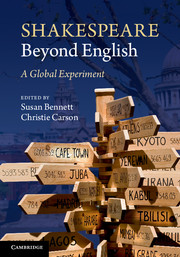Book contents
- Frontmatter
- Contents
- List of Illustrations
- List of colour plates
- Notes on contributors
- Foreword
- Acknowledgements
- Introduction
- The Globe to Globe Festival: An Introduction
- Performance Calendar
- Week One
- Week Two
- Week Three
- Chapter Seventeen Power play
- Chapter Eighteen Locating Makbet/Locating the Spectator
- Chapter Nineteen ‘Who dares receive it other’
- Chapter Twenty Two Gentlemen of Verona for/by Zimbabwean Diasporic Communities
- Chapter Twenty-One Inter-theatrical Reading
- Chapter Twenty-Two ‘This is our modern history’
- Week Four
- Week Five
- Week Six
- Afterwords
- Index
- Plate section
Chapter Nineteen - ‘Who dares receive it other’
Conversation with Harriet Walter (9 May 2012) following a performance of Makbet
Published online by Cambridge University Press: 05 June 2014
- Frontmatter
- Contents
- List of Illustrations
- List of colour plates
- Notes on contributors
- Foreword
- Acknowledgements
- Introduction
- The Globe to Globe Festival: An Introduction
- Performance Calendar
- Week One
- Week Two
- Week Three
- Chapter Seventeen Power play
- Chapter Eighteen Locating Makbet/Locating the Spectator
- Chapter Nineteen ‘Who dares receive it other’
- Chapter Twenty Two Gentlemen of Verona for/by Zimbabwean Diasporic Communities
- Chapter Twenty-One Inter-theatrical Reading
- Chapter Twenty-Two ‘This is our modern history’
- Week Four
- Week Five
- Week Six
- Afterwords
- Index
- Plate section
Summary
I thought the performances on the whole were very charismatic. What I saw presented was a society where everybody was ambitious, everybody was decadent, everybody's hands were dirty and everybody knew what was going on in the mind of somebody like Macbeth because they were all (even including Duncan and Banquo) as bad as one another. I began with an open and excited mind, but fairly soon I began to feel let down.
Macduff, I thought, was set up to be a sort of dissident intellectual type standing against the Mafioso, grease-ball decadence of the rest of this world. This was reflected in his dress, but I didn't think the idea was followed through. His wife was a kind of bimbo on a housing estate with a cigarette and a pram, and I just didn't see how the two of them were connected…and we never witnessed his grief for her, which is such a driving force in his revenge at the end of the play.
The great asset of Macbeth, the greatness of that play, lies in the step-by-step relentless logic of the downfall of a man of some kind of moral nobility, the step-by-step disintegration of a man through his lust for power. That journey is so brilliantly charted. It’s one of Shakespeare’s shortest plays. It’s so spare and its psychological accuracy is terrifying. Every building-block in the wall is timed at the right point, so why, please, in this production is Macbeth haunted by the ghost of Macduff before he learns that he’s been killed? Why, please, is Lady Macbeth pregnant and then suddenly not pregnant? The whole point is this is a barren couple who are very paranoid and jealous about a man for whom it has been prophesied that his progeny will be kings. This feeds Macbeth’s need to kill Banquo.
- Type
- Chapter
- Information
- Shakespeare beyond EnglishA Global Experiment, pp. 154 - 156Publisher: Cambridge University PressPrint publication year: 2013



